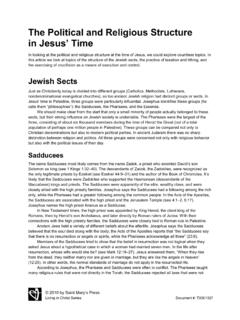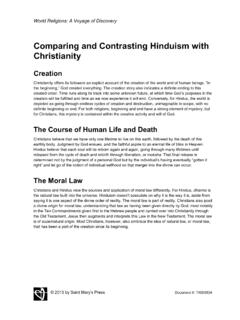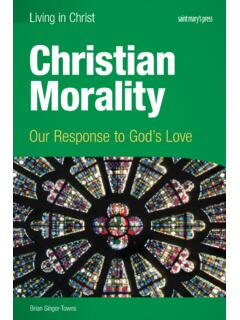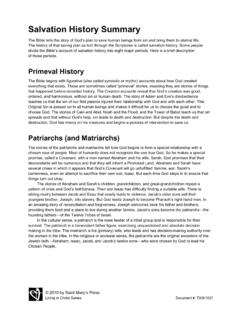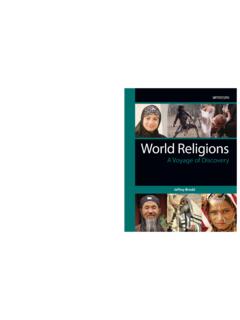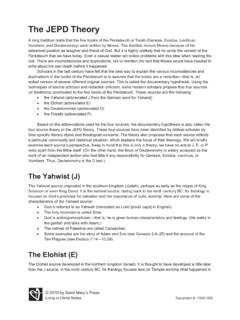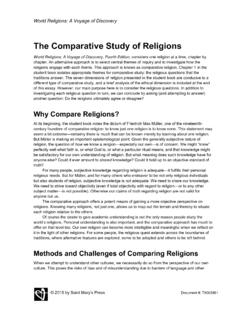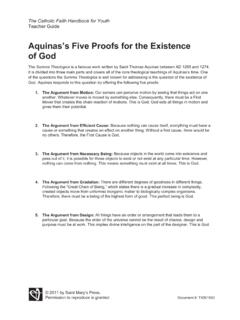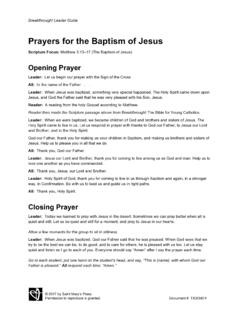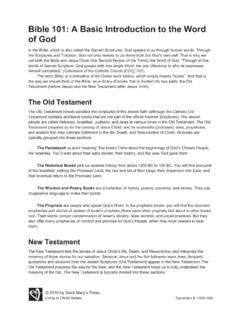Transcription of The Life and Times of First-Century Palestine
1 2010 by Saint Mary s Press Living in Christ Series Document #: TX001246 The Life and Times of First-Century Palestine Family The family was the central social institution of biblical Times . Family ties shaped economic relations: a son would typically take the trade of his father; a few wealthy families often owned the majority of land in a given society. Family ties were central to religion: priests could be drawn from Levitical families only, and high priests from certain elite families only. Families strongly influenced politics. Sons followed their fathers as kings, and the Roman Senate was open to a few powerful, aristocratic families only. Loyalty to one s family was the essential value in biblical cultures.
2 Ideally, even marriages took place within the same family (endogamous marriages). Unions between cousins were preferred: Jacob married the daughters of his uncle Laban (see Genesis 28:2; see also Genesis 24:4, Tobit 1:9). In this way, the values and loyalties of the family would remain intact. The Extended Family In modern Western society, we tend to think of the family as consisting of a father, mother, and their children. The biblical concept of family, however, generally envisioned an extended family. A few generations commonly lived together under one roof the father, mother, and children were joined by grandparents and married children. A man could have more than one wife.
3 In addition, servants or slaves of the family, or even an unrelated person living with the family, were considered to be part of the household. This extended sense of family is apparent in one of the Ten Commandments: No work may be done then either by you, or your son or daughter, or your male or female slave, or your beast, or by the alien who lives with you (Exodus 20:10). When Jacob s family moved to Egypt, his direct descendants, not counting the wives of Jacob s sons numbered sixty-six persons in all (Genesis 46:26). The Patriarchal Family Within the extended family, each person had a clearly defined social role within a hierarchical structure. The wife managed the household, and the husband earned a living for the family.
4 The father was the head of the household: a wife was subordinate to her husband, children obeyed their parents, and slaves obeyed their masters (see Exodus 20:12, Ephesians 5:21 6:9). The husband protected the honor of his family by ensuring that each person properly fulfilled his or her social role. A primary duty of the father was to pass down the teachings of the Torah to his children (see Exodus 12:26 27, Deuteronomy 6:7); he is to raise them with the training and instruction of the Lord (Ephesians 6:4). The mother, however, also has a significant role: Hear, my son, your father s instruction, and reject not your mother s teaching (Proverbs 1:8; see 6:20). Sons often followed in the same trade as their fathers.
5 James and John fished with their father, Zebedee (see Mark 1:19); Joseph the carpenter passed on this trade to Jesus (see Matthew 13:55, Mark 6:3). The father s role was to provide for and protect his family. Thus, widows and orphans were the two most vulnerable groups in ancient Israelite society, for they had no husband or father. Biblical law The Life and Times of First-Century Palestine Page | 2 2010 by Saint Mary s Press Living in Christ Series Document #: TX001246 and prophecy often stresses the need to protect them. Sirach says that God is not deaf to the wail of the orphan, nor to the widow when she pours out her complaint (35:14). This is also carried over in the New Testament: Religion that is pure and undefiled before God and the Father is this: to care for orphans and widows in their affliction (James 1:27).
6 Lines of descent are traced through the father, so generally only fathers and sons are listed in the genealogies (lists of ancestors) (see Matthew 1:1 17, Luke 3:23 38). After marriage the couple would typically move into the home or neighborhood of the husband s family. Israelite society developed many different social customs to ensure that a man would produce offspring, including polygyny, keeping concubines, and the Levirate marriage. A father s sons would inherit his property, the eldest son inheriting a double portion (see Deuteronomy 21:17). Girls could inherit property if there were no sons (see Numbers 27:8). Family and the Land The identity of a family is closely identified with its ownership of land.
7 When King Ahab wishes to buy Naboth s vineyard, Naboth replies, The LORD forbid that I should give you my ancestral heritage (1 Kings 21:3). If a man has to sell his land because of financial need, his nearest relative is obligated to buy it back (see Leviticus 25:25, Ruth 4:1 6). The Jubilee laws mandated that every fifty years, every one of you shall return to his own property, every one to his own family estate (Leviticus 25:10). Group and Individual Identity As a general rule in biblical Times , a person s identity and worth was determined more by his or her contribution to the family or wider social group (clan, tribe) than by individual achievement. Thus, for instance, marriages were arranged according to the needs of the family, rather than individual preference or attraction.
8 Abraham, for example, sends his servant to find a wife for his son, Isaac (see Genesis 24:2 4). Members of a household were in some respects considered an extension of the head of the household. Thus, when Lydia, a dealer in purple cloth, was converted by Paul to become a follower of Christ, she and her household were baptized (Acts of the Apostles 16:15). After the Philippian jailer converted, he and all his family were baptized at once (16:33). It s clear that the family members (which may have included spouses, children, and servants) did not make individual decisions to follow Christ, but rather were baptized because of their social roles as part of the family.
9 This understanding of the individual as part of the family group helps to explain a passage found in the Ten Commandments: For I, the Lord, your God, am a jealous God, inflicting punishment for their fathers wickedness on the children of those who hate me, down to the third and fourth generation (Exodus 20:5). In this passage, the children are understood as an extension of the family, thus naturally bearing the punishment of the fathers. We should note, however, that biblical passages written at a later date show an awareness of the independence of the individual. The prophet Ezekiel says explicitly, The son shall not be charged with the guilt of his father, nor shall the father be charged with the guilt of his son (Ezekiel 18:20).
10 The Family and the Kingdom of God Although Jesus was a caring and obedient son (see Luke 2:51, John 19:26 27), his vision of the Kingdom of God was a challenge to First-Century family-centered social values. Jesus insisted that loyalty to God and God s Kingdom was the highest value: if there was a conflict between loyalty to God The Life and Times of First-Century Palestine Page | 3 2010 by Saint Mary s Press Living in Christ Series Document #: TX001246 and loyalty to the family, one s loyalty to God was more important (see Mark 3:20 35). Jesus taught, If anyone comes to me without hating his father and mother, wife and children, brothers and sisters, and even his own life, he cannot be my disciple (Luke 14:26).
